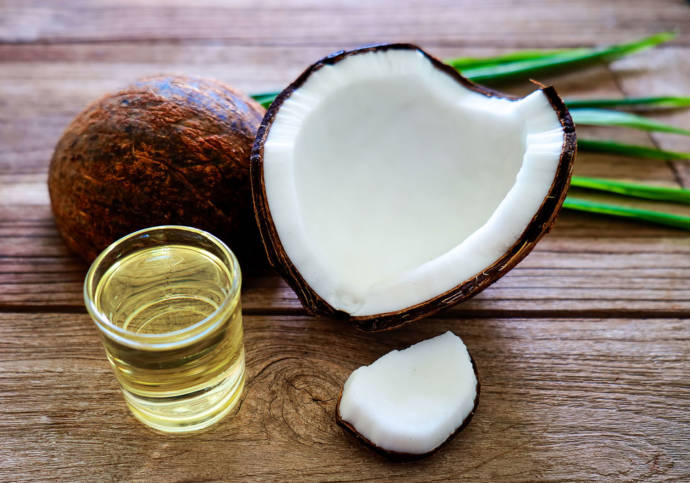
According to the USDA National Nutrient Database for Standard Reference, coconut oil is a good source of energy, lipids, and various other nutrients. It contains vitamins and minerals such as vitamin E, vitamin K, calcium, zinc, and iron.
More than 90% of coconut oil consists of FFAs or free fatty acids, saturated fats (Don’t panic! It’s not as bad as it sounds, read until the end of this and your opinion may change). A 2016 study suggests that coconut oil also contains a few unsaturated fatty acids, such as monounsaturated fatty acids and polyunsaturated fatty acids. Virgin coconut oil is no different from this.
Saturated fatty acids: Most of them are medium-chain triglycerides, which are supposed to assimilate well into the body’s systems.
Lauric acid: It is the chief contributor, representing more than 40% of the total, followed by capric acid, caprylic acid, myristic acid, and palmitic acid. The human body converts lauric acid into monolaurin. Lauric acid is helpful in dealing with viruses and diseases.
Capric acid: It reacts with certain enzymes secreted by other bacteria, which subsequently converts it into a powerful antimicrobial agent, monocaprin.
Caprylic acid, caproic acid, and myristic acid: They are rich in antimicrobial and antifungal properties
Stearic acid: This acid has cleansing and solidifying properties. Hence, it is used for skincare products.
Unsaturated fatty acids: The oil contains polyunsaturated fatty acids, linoleic acid, monounsaturated fatty acids, oleic acid.
Polyphenols: Coconut contains gallic acid, which is also known as phenolic acid. These polyphenols are responsible for the fragrance and the taste of coconut oil. Virgin coconut oil is rich in these polyphenols.
Derivatives of fatty acid: It also contains betaines, ethanolamide, ethoxylates, fatty esters, fatty polysorbates, monoglycerides, and polyol esters.
Derivatives of fatty alcohols: Apart from the above mentioned fatty acids it also contains fatty chlorides, fatty alcohol sulfate, and fatty alcohol ether sulfate.
Reference:
Nagdeve, M. (2020). Organic Facts: 9 Proven Health Benefits & Uses of Coconut Oil. Retrieved from https://www.organicfacts.net/health-benefits/oils/health-benefits-of-coconut-oil.html
